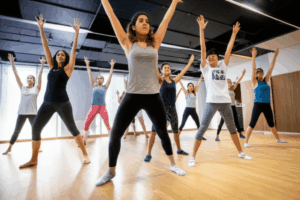A recent study from the University of Hong Kong has revealed a concerning trend: over 90% of school children in Hong Kong are not meeting the World Health Organization’s (WHO) recommended minimum of 60 minutes of daily exercise. This alarming statistic highlights a growing health crisis among the city’s youth, with far-reaching implications for their physical and mental well-being. The lack of physical activity is not just a matter of concern for individual health, but also poses a significant public health challenge for Hong Kong.
The Alarming Reality of Inactivity
The study, which tracked the physical activity of over 3,000 students using monitoring bracelets during the 2023-24 academic year, found that a mere 7.4% of participants achieved the WHO’s recommended 60 minutes of moderate-to-vigorous physical activity daily. This figure is even lower among girls, with only 6.1% meeting the target, compared to nearly 20% of primary school boys. This paints a worrying picture of the state of children’s fitness in Hong Kong, indicating a pervasive issue that requires urgent attention.
How Does Lack of Exercise Affect Children?
The consequences of insufficient physical activity are numerous and can have a detrimental effect on a child’s overall development.
- Physical Health: Children who don’t engage in regular exercise are at a higher risk of developing obesity, cardiovascular problems, and weakened bones and muscles. Lack of activity also leads to a higher risk of type 2 diabetes and poor fine motor coordination. Studies show a worrying increase in overweight and obese children in Hong Kong. One study shows that the prevalence of overweight or obese children aged 9-13 has increased from 7% to 24%.
- Mental Health: Beyond physical health, a sedentary lifestyle has significant implications for mental well-being. A lack of exercise is linked to increased rates of anxiety and depression in children. Physical activity releases endorphins, the “feel-good” hormones, which play a crucial role in mood regulation. A lack of exercise can lead to a diminished sense of well-being and make it harder for children to cope with daily stresses.
- Cognitive Function: Exercise is not only beneficial for the body but also the brain. Studies show that physical activity enhances cognitive functions, including attention, memory, and problem-solving skills. Children who do not get enough exercise may experience reduced creativity, memory and concentration.
- Sleep Quality: Lack of exercise can disrupt sleep patterns. Inactive children are more likely to have difficulties falling asleep and staying asleep. Poor sleep quality can further affect their cognitive abilities and capacity to focus, as well as worsen symptoms of hyperactivity or attention deficit.
- Long-term Health Risks: Inactivity during childhood is associated with a higher likelihood of developing chronic diseases in adulthood. These include heart disease, diabetes, and certain types of cancer. Establishing healthy habits in childhood is crucial for long-term health and well-being.
Factors Contributing to Low Physical Activity
Several factors contribute to the low levels of physical activity among children in Hong Kong.
Academic Pressure
One of the most significant factors is the immense pressure on children to excel academically. Many parents prioritize academic success over physical fitness, enrolling their children in numerous tutoring sessions and extracurricular classes, leaving little time for physical activities. This emphasis on academics often leads to children spending more time indoors studying rather than engaging in physical play.
Increased Screen Time
The rise of electronic devices and the increasing amount of time children spend in front of screens is another major factor. The COVID-19 pandemic exacerbated this issue, with studies showing that primary school students’ screen time tripled to seven hours a day during school closures. This increased screen time not only reduces physical activity but also leads to poor sleep quality and can negatively affect children’s emotional and behavioral development.
Limited Access to Safe Play Areas
In a densely populated city like Hong Kong, access to safe and accessible places for children to play and engage in physical activities can be limited. This lack of suitable environments further discourages children from being physically active, especially in their free time.
Parental Influence
Parental attitudes and behaviors play a crucial role in shaping children’s physical activity habits. If parents do not prioritize physical activity, their children are less likely to do so either. A lack of parental support and encouragement can also contribute to lower levels of physical activity among children. Studies show that parental perceptions of children’s competence and the benefits of exercise directly influence parental support, which in turn, affects children’s physical activity.
Addressing the Issue: What Can Be Done?
Combating this health crisis requires a multi-faceted approach involving parents, schools, and the government.
Encouraging Parental Involvement
Parents must be educated on the importance of physical activity and encouraged to prioritize their children’s physical well-being. This can involve:
- Setting Limits on Screen Time: Implementing strict rules on when, where, and how children use technology.
- Promoting Active Play: Encouraging children to engage in active play, both indoors and outdoors.
- Being Role Models: Parents should also engage in regular physical activity to serve as positive role models for their children.
- Family Activities: Parents can participate in physical activities with their children, strengthening family bonds and encouraging an active lifestyle.
Enhancing School Physical Education
Schools play a critical role in promoting physical activity among children. This includes:
- Prioritizing Physical Education: Schools need to ensure that physical education classes are not only mandatory but are also engaging and effective.
- Providing Adequate Facilities: Schools must provide adequate facilities and resources to support physical education programs.
- Promoting Active Breaks: Schools can encourage physical activity during recess and lunch breaks.
- Extracurricular Sports: Offering a variety of extracurricular sports and physical activity programs.
Government Initiatives
The Hong Kong government has initiated several programs to promote physical activity. These include:
- “StartSmart@school.hk” Campaign: This campaign encourages schoolchildren to be more physically active.
- “I’m So Smart” Community Health Promotion Programme: This program promotes healthy lifestyles, including regular physical activity in the community.
- “Sports for All” Promotional Activities: These activities encourage people of all ages to participate in sports.
- Opening up School Facilities for Promotion of Sports Development Scheme: This initiative opens up school facilities for sports development.
- Enhancing Public Spaces: The government is working to enhance public open and play spaces to make them more accessible for physical activity.
Other Strategies
In addition to these measures, other strategies could include:
- Promoting Active Transportation: Encouraging children to walk or cycle to school.
- Using Exergaming: Combining the appeal of video games with the benefits of exercise.
- Community Programs: Developing community-based programs that promote physical activity.
The Path Forward
The findings from the University of Hong Kong study serve as a critical wake-up call. The lack of exercise among Hong Kong’s children is not just a personal health issue, it is a pressing public health concern that demands immediate and comprehensive action. By addressing the root causes and implementing a multi-pronged approach, Hong Kong can strive to ensure that its children grow up healthy, happy, and physically active. Failing to do so risks compromising not just their health, but the future of the city itself.







